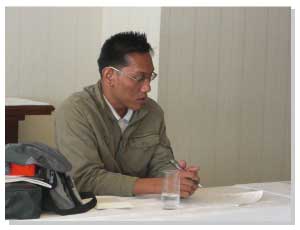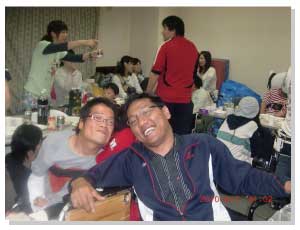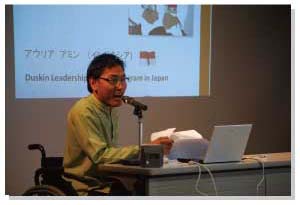- HOME
- Alumni News
- Mulyadi Aulia Amin (11th trainee)
- Amin's Final Report
Amin's Final Report
Introduction
I arrived in Japan on August 31, 2009. I am the fifth fortunate Indonesian trainee, who has had the firsthand opportunity to see and experience disability movement in Japan. It was not only my first overseas visit, but also a dream has come true, to visit a country that I had long dreamt of visiting since childhood. When I finally set foot in Japan, I was so overwhelmed with excitement with the awareness that I was really, finally, in Japan. Before coming to Japan, I had thought that a country like Japan that grew rapidly must have clearly defined opportunities and equality for persons with disabilities to participate in the society and live their lives in their communities. But the people in Japan with disabilities were still running around to accomplish a variety of movement and activities. This left a strong impression on my mind.
The first three months
It was very lucky that I could study “real” Japanese in Japan, where Japanese is spoken regularly. The teachers had an excellent way to instruct. While I worked very hard on Japanese in order to understand the contents of the training, Ms Okuhira and Ms Nakatani kept encouraging me to carry on and also gave me good advice. During the Japanese language training, I attended a number of wonderful Japanese disability activities, including international seminars and disability events. In addition, for the first time in my life, I had swimming lessons. At first the depth of the water scared me very much; but after seven lessons, I was finally able to move freely in the water. It was one of the most incredible experiences of my life.

Home-stay
I went for the home-stay program, equipped with the skill of the Japanese language I had acquired in the first three months of the training. The home-stay program was a wonderful opportunity to spend a week of the New Year at the home of a Japanese family. The Nakajima family of Sendai City greeted me with such a warm welcome. By Japanese tradition, everyone goes back to their hometown to spend the New Year together with their families and relatives. It was the same for the Nakajima family. The dad’s brother came back from Tokyo with his family, which made the New Year Holidays an even more delightful experience. I also got to see how busy the New Year Holidays was in Japan, with everyone cooking “Osechi” that is the New Year’s food.
Ski training
I had never once dreamed in my life that I would one day be skiing. Since arriving in Japan, I saw many Japanese people with disabilities enjoying life just like people with no disabilities. I suppose seeing that opened up my mind. I now feel that people with disabilities should seek to enjoy life the way they want. Given equality and opportunity, people with disabilities can live happily with dignity.
Individual training
1. CIL Shimonoseki
The first individual training took place at a center for independent living in Shimonoseki, one of the districts of Yamaguchi Prefecture. I met a number of people with light to severe disabilities. They were managing their personal lives and actively involved in the operation of the center for independent living. I learned about how to fight for advocacy and also had the opportunities to visit historic places of interest, such as hot springs and old Buddhist temples. The leader of CIL Shimonoseki, Mr. Kawamoto told me that the success of struggle does not depend on the educational background of the leader, rather, the spirit and determination to keep working hard to achieve the goals. Thank you Kawamoto-san, you are the first person who has made me realize that in disability movement, ambition is irrelevant to background.
2. CIL Assist MIL
After Shimonoseki, I went to CIL Assist MIL in Mishima City, Shizuoka Prefecture for my next individual training, where I was apparently the first trainee ever. Here too, the center was run and managed by people with severe disabilities, who constituted the majority of the center’s members. The most meaningful experience for me at the center was learning about the method and procedure of peer counseling. Peer counseling does not only help people with disabilities to come to accept their disabilities, but also helps self-empowerment. I came to have a much more comprehensive understanding of peer counseling’s objectives and significance. Mr. Iwamoto, one of the leaders at the center, told me that discrimination is something that people with disabilities often encounter in their everyday life. During the one month stay at the center, I visited other cities and towns to visit other centers for independent living, and places where people with disabilities were at work. In Japan, people with disabilities are working for a salary, even though there is the disability welfare system. Because of the time I spent at CIL Assist MIL, I finally had a clear understanding of how to work to improve the lives of people with disabilities in the local community.
3. A.J.U. Center for Independent Living
At A.J.U. in Nagoya, I continued to learn more about centers for independent living, and also about how to work towards and negotiate with the society and local government to gain more support. A.J.U. is particularly famous in the disability movement to “conscientize” everyone in the society. The life story of Mr. Yamada inspired me so much, and gave me the confidence and energy to work on my future dreams. I also had a chance to visit Wadachi Computer House and Peer Nagoya, run by A.J.U., and wanted to establish similar organizations in Indonesia. These two wheels of A.J.U. were making such great contributions to improve the lives of people with disabilities.
4. Japan Council on Independent Living Center (JIL)
I visited Japan Council on JIL for one day. It is an association of independent living centers from across Japan, and formulates the general direction of CIL movement in Japan. The mechanism of CIL movement in Japan taught me that networking and good relationships are key to the success of the CIL movement.
5. Center for Independent Living “Partner”
As I spent a lot of time learning about centers for independent living, I had some room in my schedule, so I looked back on the areas that I had not understood quite well to gain further understanding. At Center for Independent Living “Partner”, the representatives and staff were all young and had great spirits and a variety of great methodologies for disability movement, which inspired me very much. For the first two weeks I learned about Partner’s networks. It was so intense. I also spent three days visiting Independent Living “Muchu” Center, as part of the training to learn more about Partner’s networking activities. I spent the next two weeks visiting several places where people with disabilities of all kinds were at work, or receiving medical rehabilitation. I also visited an organization in Higashi Osaka that marketed and sold products manufactured by people with disabilities.
6. Mainstream Association
Next, I visited Mainstream Association. I had such colorful, happy 10 days there, spending time with the members of staff who were so friendly. The memorable thing about Mainstream is that it was like a big family. Mr. Kadota, one of the founding members of Mainstream, succeeded in creating a sense of togetherness amongst all members of staff. I came to understand Mainstream’s history, and also the personal history of Mr. Kadota. I was also touched by meeting and having a conversation with Mr. Tamaki. His programs are broadcast on NHK every week. They follow the lives of people with disabilities with a unique perspective.

Conclusion
Finally my training has come to an end. This training project, that supports people with disabilities in the Asia and Pacific Region to gain equality of opportunity, is a program that is unparalleled in the world. In the 10 months, I learned about disability movement and Japanese culture and spirit, among many others. The people of Japan loved me as if I were their family. Yes, I fell in love with Japan.
Life is only meaningful when it means something to someone else. Now I know that the true meaning of disability is relaying love, all across the world. I cannot help feeling deeply touched, by the purpose of this program—to change the world for others. I am going to utilize everything I learned in Japan, for people with disabilities in Indonesia. I want to change Indonesia’s society.
I will always have the feeling of respect, for Ms. Okuhira at Japanese Society for Rehabilitation of Persons with Disabilities. I will never forget Ms. Nakatani’s attention and the discipline and integrity of Ms. Nasu. I would like to extend my heartfelt thanks, to the people at the Duskin AINOWA Foundation.





